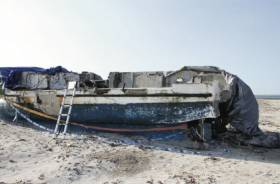Displaying items by tag: FV Aisling Patrick
Small Boat Fishermen Reminded Of Requirements After MCIB Reports Into Fatal Incidents
New Marine Notices from the Department of Transport, Tourism and Sport (DTTAS) remind skippers and crew of small fishing vessels of the requirements set out in the relevant Code of Practice, following the official maritime reports into two fatal incidents off the West Coast last year.
Marine Notice No 38 of 2019 has been published in response to a fatal fishing boat capsize off Co Mayo in the spring of 2018, as previously reported on Afloat.ie.
One man died and two others were recovered some 16 miles off Eagle Island after their vessel, the FV Aisling Patrick, overturned on the afternoon of 10 April last year.
The report from the Marine Casualty Investigation Board (MCIB) clarifies that their vessel had begun to list to starboard and while that was being investigated, a wave struck from the port side and flooded the deck.
Before the skipper could complete a Mayday call, a second wave came from the port side that capsized the boat.
Only one of the three made it into the vessel’s liferaft, while the deceased “was in the water face down and did not make any attempt to swim or stay afloat”.
The upturned hull of the vessel drifted away but was reported off South Uist in Scotland some three weeks after the incident and later inspected.
While the MCIB report did not determine conclusively the cause of the capsize, it was noted that the vessel’s stability was affected due to water ingress — possibly from suboptimal pipe connections — and that the bilge alarm system did not give early warning to the skipper or crew.
Among other findings, it was noted that none of the three men on board was wearing a personal flotation device (PFD), and that the deceased — who had been returning to fishing after a number of years away — had not completed necessary training.
The Marine Notice reminds owners that any major repairs or modifications must comply with the Code of Practice (CoP), and that their vessel must be maintained and operated in accordance with its requirements.
A second Marine Notice, No 39 of 2019, pertains to the investigation into the sinking of a small boat while laying lobster pots off Connemara on 23 May 2018.
As reported here by Lorna Siggins earlier this month, the MCIB found that the boat’s owner, who died in the incident, had purchased a substantial amount of safety equipment — almost none of which was on board at the time.
The notice refers to the same CoP as well as to the advisory published this summer relating to the safety of small vessels engaged in pot fishing.






























































